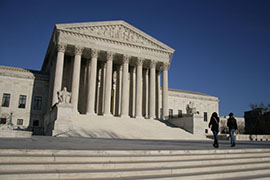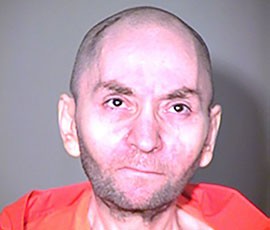Cronkite News has moved to a new home at cronkitenews.azpbs.org. Use this site to search archives from 2011 to May 2015. You can search the new site for current stories.
U.S. Supreme Court to give Arizona death-row case an unusual 13th look
WASHINGTON – When the Supreme Court’s justices sit down Friday to consider which cases to hear, one appeal will be familiar – an Arizona murder case that the justices have taken up the last 12 times they met.
Experts say it is unusual for the justices to consider one case 13 times in a row – so far – at their regular case conference without turning it down or agreeing to hear it. And while they say no one can know for sure, they have several theories why Ryan v. Hurles has been hanging around since before the court’s current term started in October.
“Twelve is a long time,” said Dale Baich, an assistant federal public defender in Arizona. “I don’t recall seeing a case held over for that many times.”
The petition to the Supreme Court is the latest twist in the 22-year case of Richard Hurles, who killed Buckeye librarian Kay Blanton in 1992 when he stabbed her 37 times as she worked alone in the library. He was convicted in 1994 of burglary, attempted sexual assault and first-degree murder, and sentenced to death.
Hurles has filed repeated appeals since then, getting to the point that a death warrant was issued in 2000 before it was stayed.
Among the claims in his latest round of appeals is a charge of judicial bias against trial Judge Ruth Hilliard. Hurles had asked that Hilliard – the judge at both his trial and his sentencing – not be allowed to consider his second post-conviction review.
But that request was denied by Maricopa County Superior Court Judge Eddward Ballinger. Hilliard then denied Hurles’ second petition, a decision that was affirmed by the Arizona Supreme Court.
But the 9th U.S. Circuit Court of Appeals disagreed and in January 2013 a three-judge panel of that court ordered an evidentiary hearing into Hurles’ bias claim.
The Arizona attorney general’s office appealed that ruling last summer to the U.S. Supreme Court, which first put Hurles’ case on its conference calendar Sept. 30. It has put the case on every conference calendar since then, 12 so far, without deciding whether or not to hear it.
“We really don’t know why the case is being held,” said Baich.
But he, like others, offered several possible explanations: The court could be waiting for a decision in a different case to be resolved first, it could be writing an opinion, or a justice, or justices, might be writing a dissent should the case get rejected.
“This is pure speculation on my part,” Baich said. “There could be a number of reasons.”
Amy Howe, editor for the U.S. Supreme Court blog SCOTUSblog, said it is also possible that a justice might be rewording the petition. Or it could just be that the four votes needed to issue a writ of certiorari – agreeing to hear the case – are not there yet and justices are trying to pick up that fourth vote.
Paul Bender, a law professor at Arizona State University’s Sandra Day O’Connor College of Law, said the delay is most likely caused by the court waiting to see a 9th Circuit decision on a similar case that “might resolve the issues in this case.”
The Hurles’ case is “an issue that they’re potentially interested in, but whether they’re really going to take it depends upon what the 9th Circuit did and what the state’s going to do after that,” Bender said.
Howe said despite the theories, there will be no way of knowing the reason for the delay until after the court has either granted or rejected the appeal.
“You just don’t know until you actually see what’s happening,” she said.








